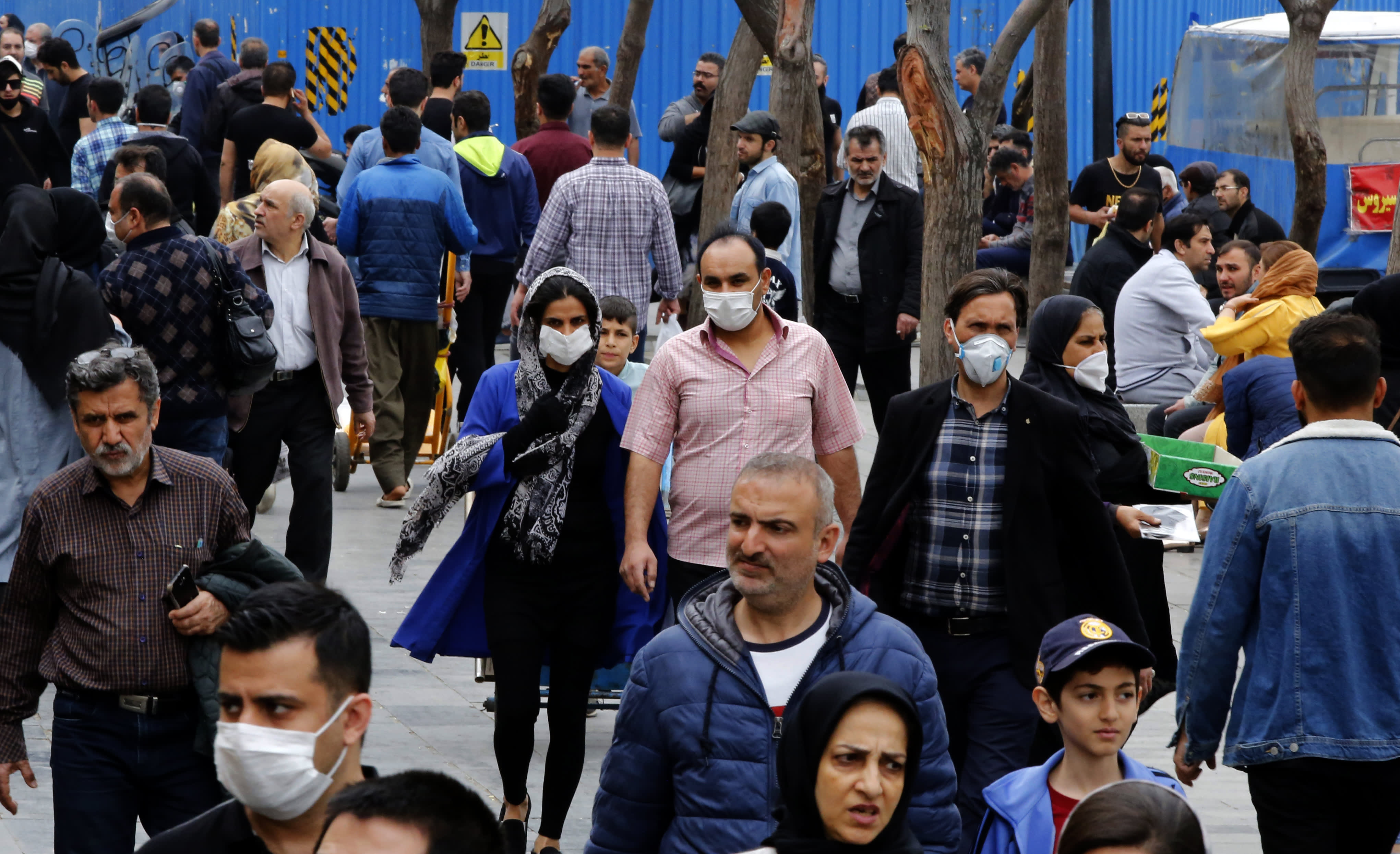Iran’s coronavirus daily death tolls hit record highs as currency falls to historic low

Iranians, some wearing protective masks, gather inside the capital Tehran’s grand bazaar, during the Covid-19 coronavirus pandemic crises, on March 18, 2020.
AFP | Getty Images
DUBAI, United Arab Emirates — Iran, the Middle East’s coronavirus epicenter, is reeling from a new wave of infections and deaths as it registers its highest single-day fatality count yet for two days running.
The national single-day death toll from the virus was reported at 272 on Monday, up from the previous day’s record of 251. At the same time its spiraling currency, the rial, has been consistently falling to historic lows against the dollar, trading at 317,000 to the dollar on Tuesday afternoon London time, according to rial exchange site Bonbast.com. The greenback has gained 138% against the rial year-to-date.
The currency nosedive comes as new sanctions from the Trump administration, enacted last Thursday, came down on 18 major Iranian banks previously excluded from the sweeping sanctions Washington has unrolled on Iran since pulling out of the multilateral Iranian nuclear deal in 2018. It’s the latest move aimed at shutting Iran out of the global financial system.
“Our sanctions programs will continue until Iran stops its support of terrorist activities and ends its nuclear programs,” Treasury Secretary Steven Mnuchin said of the move. “Today’s actions will continue to allow for humanitarian transactions to support the Iranian people.”
U.S. Treasury Secretary Steve Mnuchin speaks during a news conference to announce the Trump administration’s restoration of sanctions on Iran, at the U.S. State Department in Washington, September 21, 2020.
Patrick Semansky | Pool | Reuters
Iran’s economy is already in tatters, with inflation expected to reach 50% amid government mismanagement and much of its trade throttled by sanctions. Oil exports, a key source of revenue, have also been slashed to record lows under sanctions, but the pandemic-induced crash in oil prices has hobbled the economy even further.
Iranian Foreign Minister Javad Zarif called the sanctions a “crime against humanity.”
“Amid Covid19 pandemic, U.S. regime wants to blow up our remaining channels to pay for food & medicine,” Zarif tweeted on Thursday. “Iranians WILL survive this latest of cruelties. But conspiring to starve a population is a crime against humanity. Culprits & enablers—who block our money—WILL face justice.”
While the sanctions do not explicitly block humanitarian transactions, analysts say they are likely to deter foreign banks from transacting with Iran at all, including on humanitarian trade. The rial’s depreciation also makes it significantly harder for Iran to purchase and import medical supplies, analysts say.
Iranian hospitals overwhelmed
Iran has the highest number of infections and casualties from the coronavirus in the Middle East region, with more than 504,000 cases and 28,826 deaths recorded so far, according to data compiled by Johns Hopkins University. Its government has for months been accused of underreporting numbers.
Experts note that virus figures may be higher in other countries in the region such as Yemen and Syria, but both are mired in wars and lack the medical and testing infrastructure to report accurate numbers.
In Iran, the capital Tehran is reportedly facing the worst outbreak. Iran has required all hospitals, including private and military hospitals, to treat coronavirus patients and avoid taking on non-emergency cases. One member of the country’s coronavirus task force, Masoud Mardani, warned of full or overwhelmed hospitals.
“We had not experienced this level of deterioration in the past seven or eight months … some hospitals are full and unable to admit new patients,” Mardani was quoted as saying in the Financial Times. “Continuation of this trend could lead to an eye-catching rise in the number of deaths.”
Snap back sanctions and an expiring arms embargo
In addition to the pandemic and new sanctions, Iran is now further cornered geopolitically after a diplomatic agreement announced between Israel, the UAE and Bahrain establishing ties for the first time, bringing a more fortified anti-Iran alliance much closer to the Islamic Republic’s shores.
The developments come ahead of the October 18 expiration date on a U.N. arms embargo on Iran, which the U.S. tried but failed to extend after being soundly defeated by other members of the U.N. Security Council in a vote.
The Trump administration triggered a “snap back” of nearly all U.N. sanctions on Iran last month, even as the European, Russian and Chinese signatories to the 2015 nuclear deal opposed the move. The “snap back” provision of the deal, known as the JCPOA, was designed to be enacted in the event that Iran was found in violation of the deal’s parameters, which lifted sanctions on Iran in exchange for curbs to its nuclear program.
Tehran has gradually rolled back its compliance to the JCPOA’s operational limits, arguing that its moves are lawful given the U.S.’s re-imposition of sanctions and initial withdrawal from the deal.




